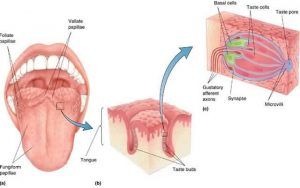Why can’t some people stand Brussel sprouts and some find it delectable?
We find many tastes inherently appealing across a broad segment of population (eg. sugar). Some tastes are acquired from cultural exposures. Yet, there are some tastes we cannot stand. Genes help us understand some of these strong inherent tastes and distastes that we have. Aversion to brussel sprouts is one of them.
So, is taste preference genetic?
There is clearly a genetic and an environmental aspect to taste preference. Which aspect dominates for what tastes is a subject of scientific research.
How do we taste?Taste is perceived by the taste receptors that are present on the surface of the tongue. Without these receptors, one will not be able to taste food, just as a color blind person is unable to see colors in objects. The type and number of these receptors are “biologically” programmed at birth. Some people have more and some less receptors. People also differ in the type and number of receptors they carry for various tastes.When we eat food, it mixes with saliva and comes in contact with the taste receptors. Taste receptors are connected to the brain through nerves. “Tasting” food is a process that involves the taste receptor on the tongue and the brain. The receptor sends a signal to the brain which then recognizes the taste. The brain recognizes that one has tasted one of the five basic tastes: sweet, sour, salt, bitter, salty, and umami. However, if you lack a specific version of a gene that produces a specific taste receptor, your ability to recognize that taste is reduced or absent.
For instance, TAS2R38 gene gives the taste sensation of bitterness and it makes a protein that interlocks with a chemical called PTC (phenylthiocarbamide), which is similar to the ones found in cruciferous vegetables like cabbages and brussel sprouts. So difference in their ability to taste or not taste PTC explains why some hate and some prefer these vegetables!There are different versions of TAS2R38 gene and which version you carry influences the level of perception of bitterness. People with two copies of PAV type of this gene display maximal perception of bitterness, whereas people with two copies of AVI type of this gene display minimal perception of bitterness. People with one copy of each type, PAV/AVI corresponds to moderate perception of bitterness.
Interesting story behind the “PTC gene”A chemist named Arthur Fox was working with phenylthiocarbamide (PTC) in the lab. His colleague complained about a horrible smelling odor, while Fox couldn’t smell anything! This is when Fox set out to discover why some people could smell and taste PTC while others could not. This incident allowed Fox to connect the dots between people’s genetic material and their ability to sense PTC.
Later the gene for the PTC taste receptor, TAS2R38, was identified in 2003. Although TAS2R38 gene is a critical determinant of whether a person can or cannot taste PTC, other genes and environmental factors such as age, smoking, food/ drink patterns also come into play.There is an evolutionary significance that could be attributed to the sense of taste. Plants initially evolved the ability to produce these toxins to prevent themselves from being eaten. Likewise, humans as well as other animals evolved the ability to avoid these toxins through bitter taste to avoid becoming sick or being killed.
Being able to taste bitterness enables a person to either completely avoid these plants or at least moderate how much is being consumed. So this suggests that people who have maximal perception of bitterness had the evolutionary advantage (by avoiding toxins) over those who have minimal perception. However, not all toxins are bad for everyone. Some toxins only act on some species while benefiting others. So the ability to consume bitter tasting food which is non-toxic but has nutritional and medicinal value was useful during human evolution.
Want to know if you have the “the brussel sprouts gene” Xcode’s nutrigenetics test can tell you what versions of the TAS2R38 gene you have in your DNA. You can also learn about how your genes may influence other traits, including your risk for certain diseases. You can write to us at hello@xcode.life





